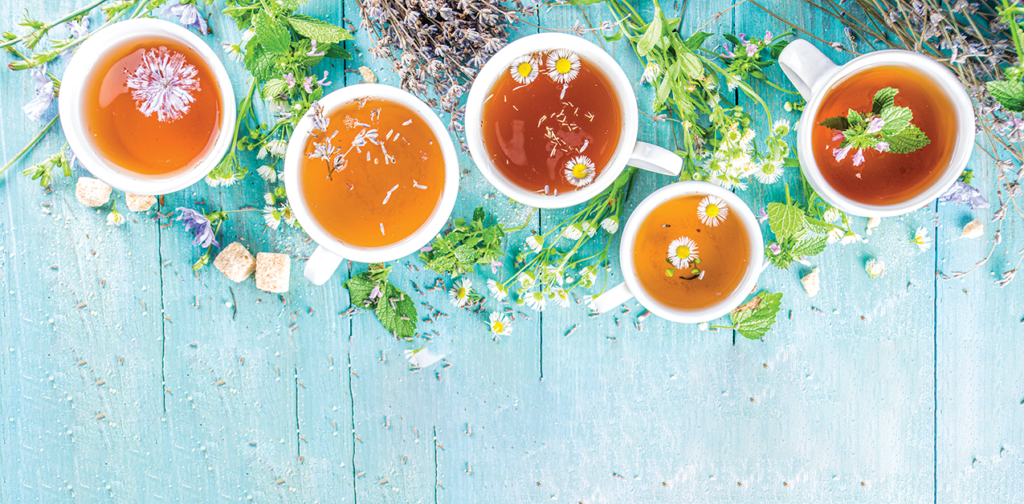Tea, including green teas, black teas, white teas, and herbal teas, has been associated with a range of health benefits. These benefits are primarily attributed to the presence of antioxidants, polyphenols, and other bioactive compounds in tea leaves. Here are some of the health benefits of tea.
Chronic Disease
Tea contains a high concentration of antioxidants, such as catechins in green tea and theaflavins in black tea, which help combat oxidative stress and reduce the risk of chronic diseases, such as cardiovascular disease and Type 2 diabetes.1 Regular tea consumption has been associated with a reduced risk of heart disease by improving cholesterol levels, reducing blood pressure, and promoting overall cardiovascular health. The active ingredients in tea have also been shown to reduce risk of high-fat diet-induced obesity and Type II diabetes.1,2
Weight Management
Some studies suggest that compounds in green tea can boost metabolism and aid in weight management by promoting fat oxidation and reducing appetite. It’s important to note, however, that this evidence is not based on studying the effects of consuming cups of green tea made by steeping a bag of tea in hot water. Rather, the studies used extractions of the active ingredients of green tea— catechins and caffeine—which yielded stronger concentrations of these ingredients compared to a traditional cup of green tea.3
Cognitive Function
The caffeine and L-theanine in tea may enhance cognitive function, including improved alertness, attention, and memory.4
Digestive Discomfort
Some research suggests that herbal teas such as peppermint and ginger may help soothe digestive discomfort, reduce bloating, and alleviate symptoms of irritable bowel syndrome (IBS),5,6 though more research is needed to support these findings.
Cancer
Some studies also suggest that the antioxidants in tea may help protect against certain types of cancer. One study showed an inverse association between regular tea consumption and both colon and rectal cancers, and between green tea consumption and colorectal cancer in women. More research is needed in this area as well.7
Skin Health
The antioxidant, anti-inflammatory, and antimicrobial properties of the polyphenols in topical tea formulations were shown to be effective in reducing sebum secretion and in treating acne.8 Other research reports that green tea polyphenols have photoprotective properties, indicating their potential in the prevention of sun-induced skin disorders, such as photoaging, melanoma, and nonmelanoma skin cancers.9
Autoimmune and Inflammatory Diseases
The anti-inflammatory properties of tea may help reduce inflammation in the body and reduce the effects of Type 1 diabetes and inflammatory diseases.10,11
Stress
Drinking tea, particularly herbal varieties such as chamomile or lavender, can have a calming effect, reducing stress and promoting relaxation. One study found that lemon balm, a component in many herbal tea preparations, was effectiveness in improving anxiety and depressive symptoms.12 Apigenin, a polyphenol found in chamomile, has shown positive effects on mood, memory, and stress.13
In Summary
It’s important to note that while tea offers potential health benefits, individual responses can vary, and excessive consumption may have adverse effects, especially if it leads to excessive caffeine intake. Additionally, the quality and preparation of tea can influence its health benefits. To maximize these benefits, it’s advisable to consume tea as part of a balanced diet and a healthy lifestyle. Always consult with a healthcare professional for personalized advice, especially if you have specific health concerns or conditions.
Sources
1. Deka A, Vita JA. Tea and cardiovascular disease. Pharmacol Res. 2011;64(2):136-45.
2. Chacko SM, Thambi PT, Kuttan R, Nishigaki I. Beneficial effects of green tea: a literature review. Chin Med. 2010;5:13.
3. Jurgens T, Whelan AM. Can green tea preparations help with weight loss? Can Pharm J (Ott). 2014;147(3):159–160.
4. Owen GN, Parnell H, De Bruin EA, Rycroft JA. The combined effects of L-theanine and caffeine on cognitive performance and mood. Nutr Neurosci. 2008;11(4):193–198.
5. Alammar N, Wang L, Saberi B, et al. The impact of peppermint oil on the irritable bowel syndrome: a meta-analysis of the pooled clinical data. BMC Complement Altern Med. 2019;19(1):21.
6. Nikkhah Bodagh M, Maleki I, Hekmatdoost A. Ginger in gastrointestinal disorders: A systematic review of clinical trials. Food Sci Nutr. 2018;7(1):96–108.
7. Yang G, Shu XO, Li H, et al. Prospective cohort study of green tea consumption and colorectal cancer risk in women. Cancer Epidemiol Biomarkers Prev. 2007;16(6):1219–1223.
8. Saric S, Notay M, Sivamani RK. Green tea and other tea polyphenols: effects on sebum production and acne vulgaris. Antioxidants (Basel). 2016;6(1):2.
9. Katiyar SK. Skin photoprotection by green tea: antioxidant and immunomodulatory effects. Curr Drug Targets Immune Endocr Metabol Disord. 2003;3(3):234–242.
10. Winiarska-Mieczan A, Tomaszewska E, Jachimowicz K. Antioxidant, anti-inflammatory, and immunomodulatory properties of tea: the positive impact of tea consumption on patients with autoimmune diabetes. Nutrients. 2021;13(11):3972.
11. Ohishi T, Goto S, Monira P, et al. Anti-inflammatory action of green tea. Antiinflamm Antiallergy Agents Med Chem. 2016;15(2):74-90.
12. Ghazizadeh J, Sadigh-Eteghad S, Marx W, et al. The effects of lemon balm (Melissa officinalis L.) on depression and anxiety in clinical trials: a systematic review and meta-analysis. Phytother Res. 2021;35(12):6690–6705.
13. Salehi B, Venditti A, Sharifi-Rad M, et al. The therapeutic potential of apigenin. Int J Mol Sci. 2019;20(6):1305.






